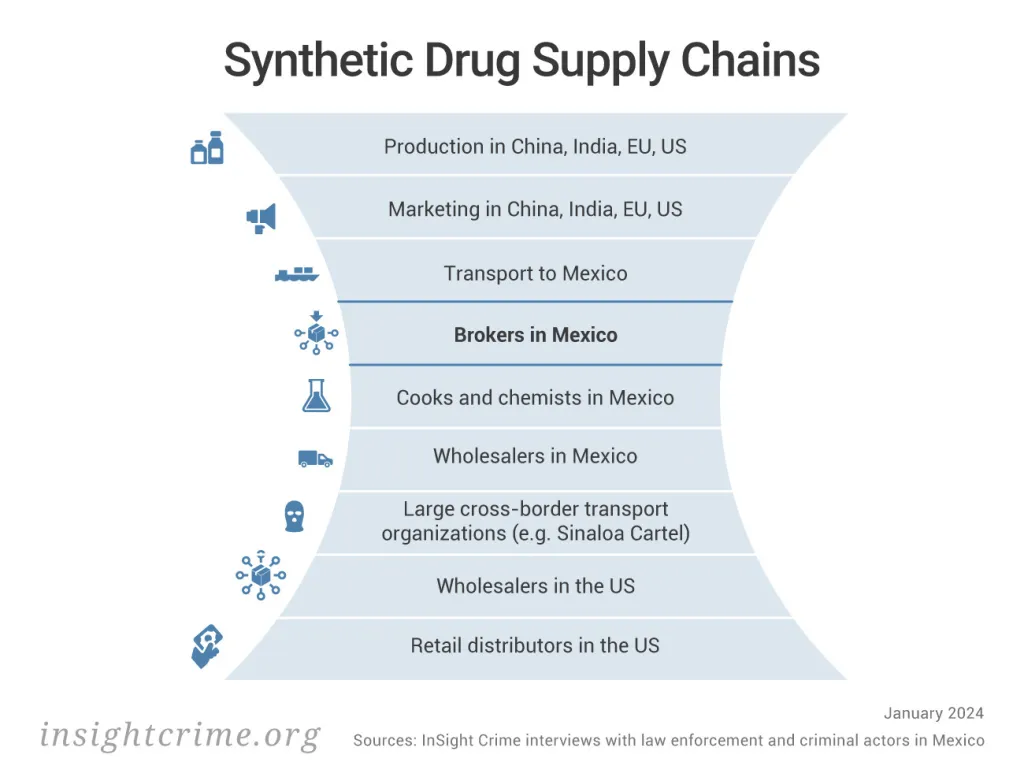Mexico’s extradition of a chemical broker to the United States marks a significant step against these middlemen, who occupy an essential but often overlooked position in the synthetic drug pipeline.
In early May, Mexican authorities extradited Francisco Pulido Coracero, alias “Don Puli” or “Pepino,” to the United States. He is accused of acting as a broker of precursor chemicals and other chemical substances used to produce methamphetamine. Don Puli is allegedly part of the Algredo broker network, whose clients include the Jalisco Cartel New Generation (Cartel Jalisco Nueva Generación – CJNG) and other criminal organizations in Michoacán.
SEE ALSO: How Precursor Chemicals Sustain Mexico’s Synthetic Drug Trade
“Precursor chemicals are the lifeblood of the Jalisco Cartel’s deadly drug trafficking operation,” said Attorney General Merrick B. Garland in the US Department of Justice (DOJ) press release announcing Don Puli’s extradition.
The Algredo network was led by Javier Algredo Vázquez, who was sentenced to 18 years and eight months in prison in February 2024, and his brother, Carlos, who was named as a co-conspirator alongside Don Puli and arrested in November 2023. His extradition to the United States is pending, the DOJ said.
According to court documents from Javier Algredo’s case, the Algredo precursor chemical network provided 1,453 tons of chemical substances for methamphetamine production to Mexican clients, mainly the CJNG, between 2018 and 2021. In addition, it supplied 1,848 tons of substances used to improve methamphetamine potency and a further 44.1 tons of chemicals for fentanyl production, the potent synthetic opioid that is behind thousands of drug overdoses in the United States and Canada.
Don Puli’s links to CJNG leaders in Michoacán, a key state for methamphetamine production, have also been documented by intelligence reports from Mexico’s Defense Ministry (Secretaría de la Defensa Nacional – SEDENA) obtained by InSight Crime.
The reports allege Don Puli delivered chemicals to Juan Carlos Bañuelos Ramírez, alias “Pistones,” a CJNG cell leader who produced methamphetamine for local and international markets, and José Antonio Arroyo Otuño, alias “Toño,” a leader of a CJNG cell in Apatzingán, Michoacán. In June 2021, authorities seized 350 kilograms of methamphetamine in the town.
Synthetic drugs remain a leading cause of drug-related deaths in the United States and help fan criminal violence and forced disappearances across Mexico.
In its recently published National Drug Threat Assessment 2024 report, the Drug Enforcement Administration (DEA) found that synthetic drugs including methamphetamine and fentanyl were responsible for “nearly all of the fatal drug poisonings” in the United States last year. Over 107,000 drug overdose deaths were recorded in 2023, according to preliminary data released by the Centers for Disease Control and Prevention.
InSight Crime Analysis
Don Puli’s extradition is a milestone in US authorities’ attacks on the synthetic drug supply chain, demonstrating official efforts to target chemical brokers in Mexico as well as individual traffickers and the Chinese chemical producers they buy from.
According to InSight Crime’s open-source research, there have been at least three criminal cases against brokers operating in Mexico, including the one against the Algredo network. While US government sanctions against these networks have been more frequent, their impact has been limited.
“The United States is expanding its strategy, going beyond the traditional identification of the leaders of criminal organizations and the designation of companies and sanctions against certain individuals,” Dr. Yadira Gálvez Salvador, a professor at Mexico’s National Autonomous University (UNAM) and national security expert, told InSight Crime. “Going further down the network generates pressure on chemical brokers, and this is the critical part of the [supply] chain.”
SEE ALSO: Brokers: Lynchpins of the Precursor Chemical Flow to Mexico
Precursor chemical broker networks fulfill a vital role in the synthetic drugs pipeline, connecting essential substances for the production of methamphetamine and fentanyl from suppliers, often in China, to drug producers in Mexico. Without the chemicals they facilitate, the entire industry grinds to a halt.

As in the Algredo case, these networks often use front businesses in the pharmaceutical or chemical industries, or the import-export business, to obtain chemicals, stockpile them, and then sell them to criminal groups. The volume of chemical products that networks can facilitate means they usually require larger investments into their operations than individual brokers, who only have the capacity to import small amounts of product.
In the past, US authorities have sanctioned several Chinese companies and brokers for allegedly trafficking precursor chemicals into the United States and Mexico.
They have also targeted individual importers of precursor chemicals, such as Ana Gabriela Rubio Zea, who Guatemalan authorities extradited to the United States in July 2023. She is now in US custody, accused of acting as a chemical broker to supply substances to the Chapitos faction of the Sinaloa Cartel and other clients for the production of fentanyl.
Featured image: Crystal methamphetamine. Source: National Institute on Drug Abuse.

